|
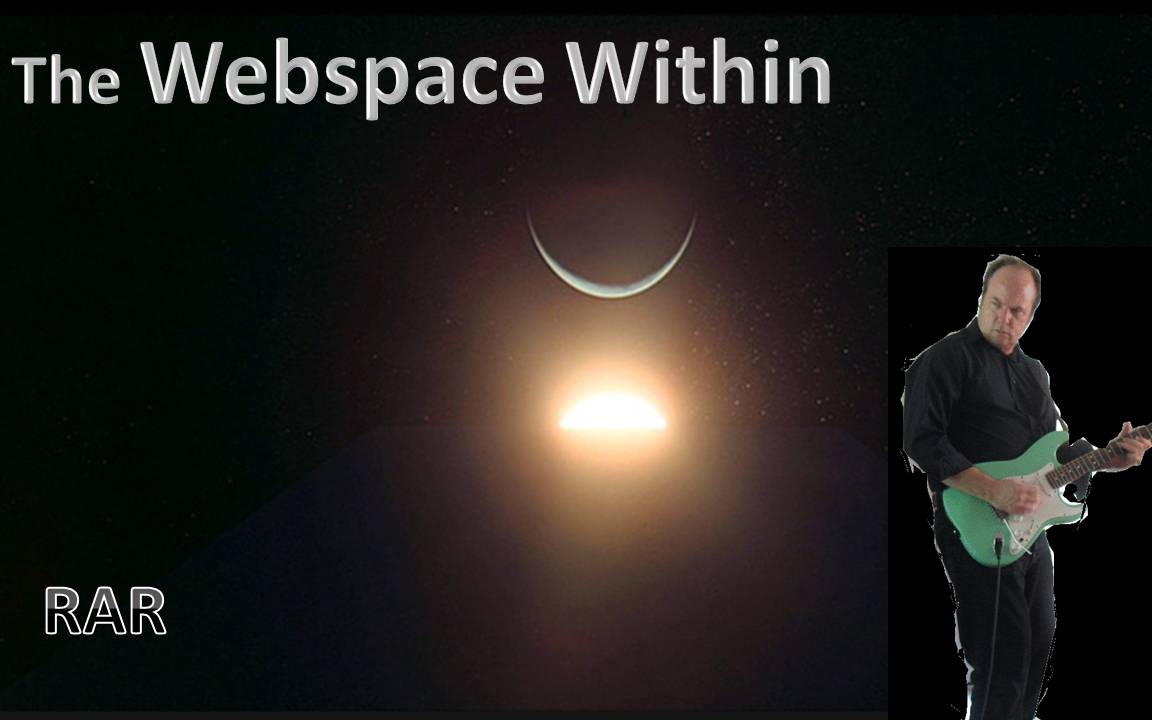
►Original
Musical Compositions and Select Covers
►Fiction
and Non-Fiction
►Special
Projects
►Essays
| |
JOHNNY VERNAZZA
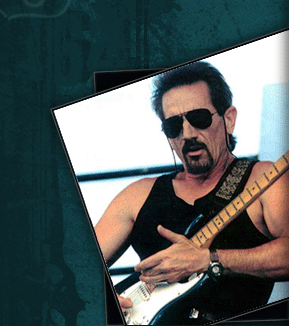
This
edition we spotlight JOHNNY VERNAZZA,
or "Johnny V" as he has long been known, though in the age of the
Internet he now competes for the title with a Canadian guitarist. Our Johnny
"V" got there first, coming up through the San Francisco scene of the
'60s as bassist and singer for the brainy psychedelic blues band Fox
before joining Elvin Bishop's band as a guitarist. He toured with Elvin
for years, recording six albums and playing the distinctive double leads on
Bishop's hits, including his biggest, "Fooled Around and Fell In
Love." Johnny came up through the ranks at the same time as another Bay Area favorite,
his buddy Norton Buffalo,
and for 20 years Johnny and Norton paired in Norton Buffalo and The
Knockouts. Johnny was just about knocked out himself two decades ago,
when a rock lifestyle of drugs and alcohol caught up with him and forced him to
reevaluate his life. His rebirth seemed complete in 2002 when he released
his critically acclaimed first solo CD, Feel Like Goin' Home. Johnny, a
Bay Area native, is a southern rocker at heart, and a blues man. Living the
suburban life in Southern California now, in a home north of San Diego he
purchased with his psychotherapist wife, Johnny's life seems in order.
At 57 he has his own band, The Johnny Vernazza Band, and some clear
insights on what it takes to be happy in the bosom of rock and blues.
JOHNNY
"V" VERNAZZA
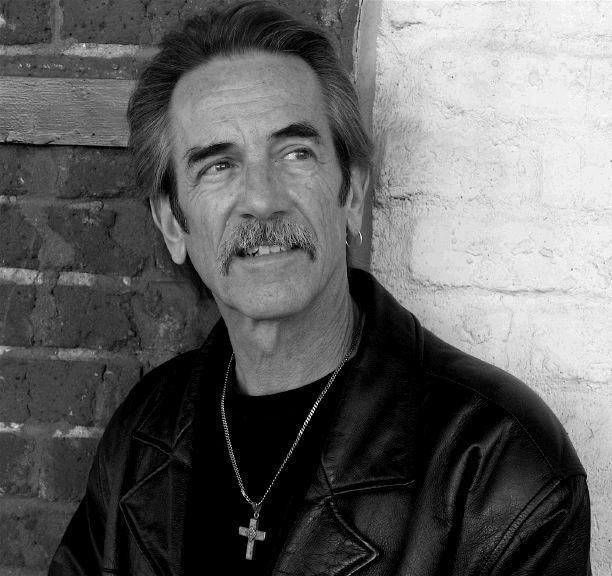
by
RAR
Johnny
Vernazza was born in San Francisco to a working class Italian family,
"Genovese on both sides...," Northern Italians. The
family spoke Italian around the house when he was growing up in Daly City,
but stopped when his older sister started getting teased about it at school.
Johnny grew up playing on his grandparents' produce farm, which was located at
the present site of the Daly City BART Station. And early on he was drawn to the
limelight.
"I
wasn't shy, I made friends fast, and usually things just swung around to my
music," he recalls. "Even before I was really playing guitar I would
get up and sing at the (school) assemblies. I entered dance contests back when
they used to have that... I always was like that, even when I was in Grammar
School in Redwood City still, the teachers would let me go around to the classes
and I would do like the whole Ed Sullivan show. I would do imitations and sing.
I was one of those little kids who was probably pretty annoying to some. Who
knows..."
The
entertainment gene Johnny carries came from his father, who was one of the "Vernazza Twins," an accordion duo popular in the Bay Area in
the 1940s and '50s, whose time in the limelight included an appearance on the
Ted Mack Amateur Hour.
Johnny's
father started him on the accordion. "I took accordion lessons and played
accordion for about three years - I took lessons from the same brother who
taught my dad," says Johnny. "That ended because (the teacher)
realized that I wasn't reading, I was cheating. He was whacking me on the back
of the head, and then my dad came to pick me up and I could hear him yelling at
my dad in Italian, and I was crying in the back room. And there was a guitar
hanging on the wall, and I told my dad I wanted that guitar. And he bought it
for me."
Johnny
was self-taught on that first acoustic, before going to purchase his first
electric - a Premiere guitar/amp combo - from Alec's, a Wal-Mart-like department
store of the post-WWII era. The music guys there gave lessons and Johnny got
training that took immediately. "Within a year of the time I started taking
lessons I started playing professionally," Johnny says. "So by '64, I
was out there..."
At
15, Johnny was fronting a band that was climbing quickly through the Bay Area
food chain, winning "battle of the bands" contests and the
opportunities that came with those successes. "We won the battle of the
bands at the San Mateo County Fair. One of the prizes, besides a shopping spree
at Dom Weir's, was...Sly Stone had a club called The Upper Room at The
Playpen, on Divisadero Street, and we got to play there. I remember my dad had
to drive me there..." In the audience was Billy Preston.
| Click here
to listen to Johnny's account of the formation of Sly
and the Family Stone and of the eccentric Sylvester
Stewart. |
Fortunate
connections abound in Johnny's story. He grew up with members of Sly
Stone's band and crew, and was a confederate of Janis Joplin and other
prominent players on the San Francisco club scene of the mid-to-late 1960s. Among
his earliest cohorts (1964) was guitarist Gary Pihl, who hit the big time
with Sammy Hagar before joining his friend Tom Sholz's band Boston (in
1978). Before all of that, Johnny and Pihl were band mates in the popular San
Francisco psychedelic blues band Day Blindness, which Johnny describes as
"...like a brainy Blue Cheer."
Day Blindness was renamed Fox and between 1968-70 became a regular
attraction at the Fillmore in San Francisco, and in the concerts taking place in
Golden Gate Park.
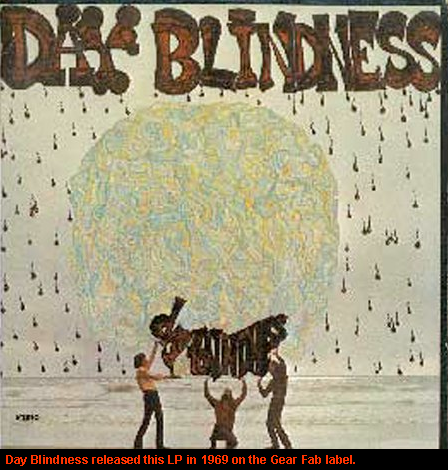 Fox
got an odd break in 1970 when they were recruited by a shadowy Korean
"mob" figure called "Jermaine" to play a big money club show in Hawaii.
"We went over on a one-way ticket," says Johnny. They played the first
night and were paid as advertised, but after that there was no pay coming,
just work. They were stuck on the island. "It was real
ugly, at first. We got saved by John Selby, who was managing Quicksilver." Fox
got an odd break in 1970 when they were recruited by a shadowy Korean
"mob" figure called "Jermaine" to play a big money club show in Hawaii.
"We went over on a one-way ticket," says Johnny. They played the first
night and were paid as advertised, but after that there was no pay coming,
just work. They were stuck on the island. "It was real
ugly, at first. We got saved by John Selby, who was managing Quicksilver."
| Click here
to listen to Johnny's account of being rescued in Hawaii by John Selby,
who snatched Fox from the clutches of mobsters and made them an opening
act for the likes of Eric Burdon and War. |
Black-balled from the local clubs, after splitting with Jermaine, Selby put Fox on as an opening act for
Eric
Burdon and War and they played shows with Quicksilver, who were living and recording
in Hawaii at the time.
Johnny
returned from Hawaii with his player credentials further established. He
toured the United States with a Gospel band that included an appearance on the
Sonny & Cher television show. He also caught a wave riding the blues scene
that was sweeping the planet, and Johnny "V" started getting
opportunities to work with blues greats Luther Tucker and Sonnyland
Slim, rock'n roll pioneer Chuck Berry, and Johnny's contemporaries
Steve Miller, Gregg Allman, George Thorogood, Charlie Daniels, and
Commander Cody.
Elvin
Bishop Band
In
1971, Johnny Vernazza was holding court at a club on Grant Street in San
Francisco's North Beach. Here he hosted visiting players and musicians from the
local scene. Elvin Bishop, who had made his name as one of two lead
guitarists (along with Mike Bloomfield) in the powerhouse Paul
Butterfield Blues Band, and who since 1969 had been fronting his own unit,
started dropping by the club to play with Johnny. Elvin, whose dual-lead
approach with Bloomfield had been emulated by many bands, most notably The
Allman Brothers, was looking for a partner to continue the two-guitar style. He
tapped Johnny V for the other slot and the two embarked on a musical
collaboration that would span much of the '70s, produce six top selling albums,
and yield such hits as "Fooled Around and Fell In Love," which reached
#3 on the Top 40 in 1976. The Elvin Bishop
Band was another groundbreaking act in the evolution of rock'n blues. Elvin was
initially working with John Coltrane veteran drummer John Chambers, but
over time took the band toward a more rock-oriented style behind the beat of Don
Baldwin. According to Johnny V, having a rock drummer "kind of drove
Elvin's band. Don Baldwin wasn't exactly a blues drummer. I don't think he had
ever even played a shuffle until he joined Elvin's band, not that we played that
many shuffles." Elvin was also
generous about sharing the spotlight and Johnny V stretched out with Elvin's
band, on stage where he was featured on solos, and in the studio where he was
granted creative freedom. "The line in 'Fooled Around and Fell In love'
that sounds like a flute, in the beginning, the intro... that's my guitar. That
line that goes through the whole song, how that came about, I already had the
line (he sings it), but when we recorded the tune...okay, I'm going to go in and
overdub that line...so the night before I was to go in - we had already done the
vocals, most of the band had already flown back... - I happened to see Chet
Atkins on Johnny Carson the night before. He played something like 'Fly Me to
the Moon' or something... he was playing harmonics, where he would pluck the
string with his thumb and hit it with his finger at the appropriate fret to make
a harmonic out of it. I saw that and said 'Shit! That's cool!' That's what I'm
going to do with 'Fooled Around and Fell In Love' tomorrow. So I walked into the
studio and explained it to the engineer and he said, 'Go get a six-pack of beer
and I'll get a reel.' The reel was for the obvious - chopping, right? What I did
was overdubbed the harmonies using the chimes like that... But if it wasn't for
seeing Chet Atkins on Johnny Carson, which basically had nothing to do with
music, I was just hanging around watching TV..."
| Click here
to listen to Johnny's description of a Chet Atkins technique he used on
"Fooled Around and Fell In Love," as well as his takes on the
techniques of Roy Buchanan, Don Rich, Steve Cropper, Jeff Beck, Joe
Satriani, Elvin Bishop, his pleasure in playing with Bay Area bluesman
Coco Montoya, his friend Gary Pihl, and his approach with the Johnny
Vernazza Band. |
Rock and Roll Life Along
with success came money and a life of serial one nighters, hotel rooms and
non-stop partying. It was the "high" side of a lifestyle Johnny V was
almost born to; one that came to him along with music, which came to him really
young. "I started drinking when I was
probably fourteen. My future brother-in-law, at the time, was in the Navy
and he used to drive up (to the San Francisco Bay Area) from San Diego. And I
asked him one time, how do you drive up on Friday and drive back on Sunday? And
he was taking pills. And so he gave me a bunch of pills and that was about it.
It opened up the doors for everything. By the time I got to Elvin's band I was
just basically doing everything. Whatever was there, I would take." "It
was like, every night was the same thing. If we were on tour together, I'd
usually end up in some hotel room with Toy Caldwell, of the Marshall Tucker
Band, God rest his soul." Toy Caldwell died of heart disease in 1993.
"We were really tight. And we would be partyin' and singing
the same songs. Maybe some different people, but the same songs every
night..." It wasn't any different on the tour bus. "I've got a picture
of myself with a windup monkey on my back, in the RV, with a Smirnoff, just
waking up, and the point is 'it was Johnny's turn to drive.' Just give him the
bottle and let him drink himself awake..." "I
don't remember half of the stuff we did, let alone half of the people we met...
I remember being on the road with Charlie Daniels and a southern rock crew a
lot, but we also did a lot with Rod Stewart and Foghat and a lot of different
bands, but I really don't remember."
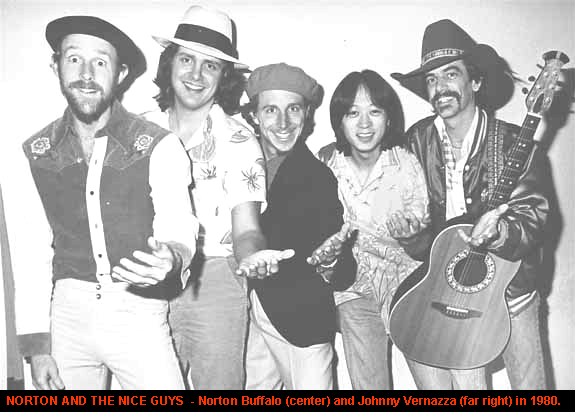 After
Elvin Bishop put his band on hiatus at the end of the '70s, Johnny went to work
with his friend, former Steve Miller band member Norton Buffalo, in
Norton and
The Nice Guys. Johnny's partying didn't stop. "The alcohol turned out to be
my worst problem. The cocaine was secondary. I snorted heroine for a good twelve
years. If I didn't have it, it was no big deal, I had my alcohol..." After
Elvin Bishop put his band on hiatus at the end of the '70s, Johnny went to work
with his friend, former Steve Miller band member Norton Buffalo, in
Norton and
The Nice Guys. Johnny's partying didn't stop. "The alcohol turned out to be
my worst problem. The cocaine was secondary. I snorted heroine for a good twelve
years. If I didn't have it, it was no big deal, I had my alcohol..." Johnny
believes, looking back, that besides whatever toll the lifestyle was taking on
his memory, it was doing worse to his mobility within the rock world. A
naturally gregarious guy, Johnny had become closed off, isolated among a
close-knit group of friendly enablers. He was circulating among a music elite,
yet missing his opportunity to capitalize on his talents. In fact, his fortunes
were taking a downturn.
It
got to where even his close friend Norton could no longer countenance Johnny's
enthusiasms. "By 1987 it was about over. In '87 I got
my first DUI and I started to be unreliable. So, Norton let me go and then in
late '88 I got about four DUIs in about as many months. Part of the problem was
that I had money, at the time, so I was just able to go on and do my drugs and
my drinks and it finally caught up with me. So I spent all of '89 in four
different counties doing DUI time. If that hadn't happened, I probably wouldn't
have stopped." Johnny credits his
county jail time with turning his life around, but he isn't exactly contrite.
"I took a high school attitude about it because it kinda was like
that. I was in the camps, and I worked. I was in the kitchen usually, and
baked... And then I also started working out and that really helped a lot. For
the first time in my life all the sudden I weighed a hundred and fifty pounds,
where before I was a ninety-pound drug addict. When I got out I just kept that
up." Johnny didn't play out at all
between 1989 and 1993- "I had no license, no way to get around, and had to
pay all these ridiculous fines off..." He then re-surfaced in his home Bay
Area, playing clubs again for a few months, then got his moment of redemption -
a phone call from Norton Buffalo inviting him back into the band. Johnny had a
steady gig again, and this time he was going to be able to remember the
experience.
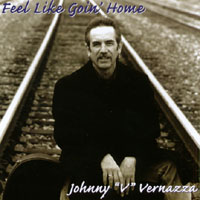 Feel
Like Goin' Home Feel
Like Goin' Home
Johnny
continued with Norton Buffalo and the Knockouts throughout the '90s and
into the new millennium. Then, in 2002, he released his first solo CD, Feel
Like Goin' Home (At The Beach Records). The CD provided recorded evidence of
what top musicians have known for years - that Johnny Vernazza is a special
player. The album ranges from blistering slide to refined jazz to honky-tonk
rock'n blues. His rendition of "Feel Like Goin' Home" is delta
distilled to its essence, a dusty, sun-baked tribute to the devil of the south
and the soul of a mortal man. Critics loved the CD, which has a breakthrough
quality about it, undeniable in its reach. Every track feels classic, timeless,
not an evocation of a style, but the style itself. It has "lift," an
energy that separates the experience of listening to it from any conscious
awareness of the performance effort. Herein
lies both the genius and the torment of Johnny V. His "stuff" is
transcendent, a sonic gift to the ages, but how do you bottle that for live
consumption? And how do you get full value for such a vintage wine?
Johnny Vernazza Band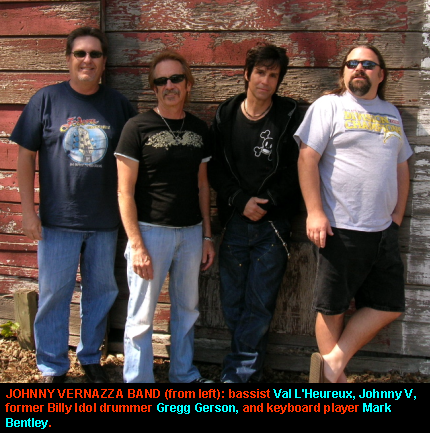 Johnny
has put together a quartet, The Johnny
Vernazza Band, to give him his own stage vehicle. Consisting of keys, bass
and drum, and himself on guitar, the band does cuts from Feel Like Goin' Home
along with numbers from Johnny's Elvin Bishop days and other classic rock'n
blues. Says Johnny - "My band... we could be classified as
'southern rock' at various times in the set. Although I do some more traditional
blues stuff, it transforms into jam band types of things..."
Johnny's
shows are spontaneous in the blues club tradition. "I write set lists if we
have a time limit, and I kinda follow 'em. But when we do some of the clubs
where I just know what's going on I just call the songs off, or just start the
songs. Sometimes I don't even know what I'm going to play, and just sort of
go on feeling, and that's a lot of fun." "We
do five or six things off my CD, then I do a couple things I did with Elvin,
"Calling All Cows" and "Honey Babe," then a pretty eclectic
set of blues and rock stuff...old Delbert McClinton, rock and jam tunes. We try
to make a club show more like a concert, and we are getting a really good
reaction." Dating back to his band
Fox, and throughout his collaborations with Elvin Bishop, Johnny's interests
have always been with songs structured as songs within songs. "I think,
structurally, to just have to play with verse, chorus, and solos for everybody
is just kinda boring."
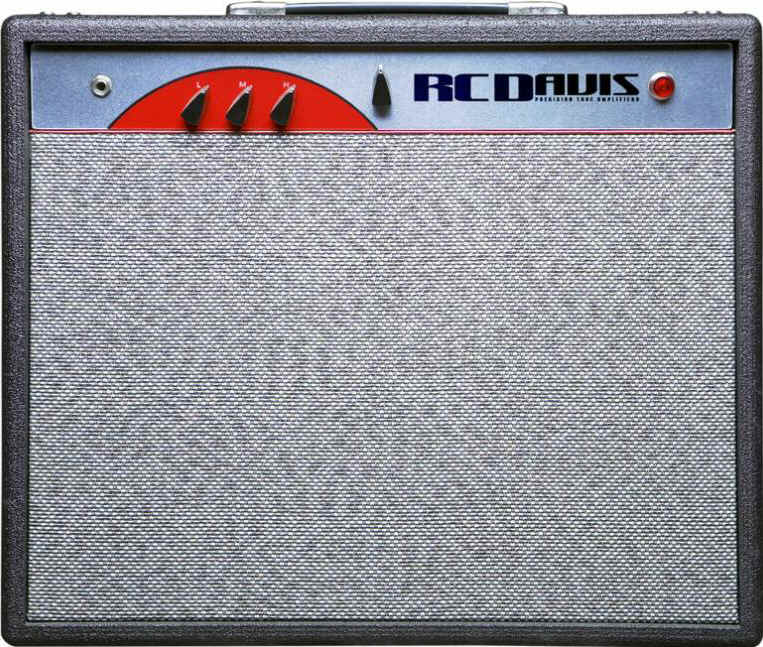
Click here
to listen to Johnny's tech talk about his current guitar/amp/effects rig,
including his collaboration with San Francisco gear designer Richard C.
Davis - see www.rcdaviscamps.com
for more information on these amplifiers.

|
Rock at Fifty-Seven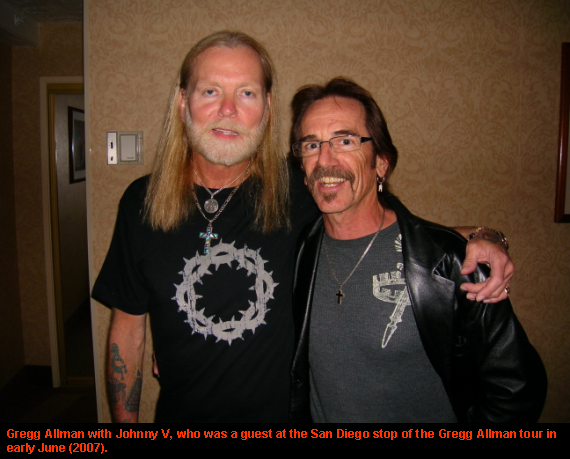 Even
as a born performer playing a form of music, the blues, that only feels
legitimate coming from a veteran, Johnny recognizes that age isn't an advantage
in pop culture. It even creates special problems with one's own repertoire.
"I've got this one tune
that is on my CD called 'Why Did Ya?' that I wrote quite a few years ago... I
was kinda debating about whether to do the tune, because it's like 'Every time
I'm knocking on your door your mama tells me you don't want to see me no more.'
Well, okay, I'm fifty-seven. Who's mama, you know? I keep wanting to write
deeper songs, and then it comes down to what's real, and what are you gonna do here. My song writing right now, yeah, it's got to take a change. I stay away
from the political stuff. I can't beat my political beliefs down peoples'
throats. And then, too, you get pigeon-holed." Another
interesting challenge for the mature musician (sounds like an oxymoron, doesn't
it?) is that after several decades one has heard a lot of music. Even a guy like
Johnny, who says he never considered being anything other than a musician, can
get enough of it after awhile.
"I don't listen to a ton of it. I go through
streaks... I'll make up CDs on my laptop, just random stuff, so I'll be
listening to everything from Buck Owens to Bill Frissel, and everything in
between. But a lot of times, like after a gig, I'm on pop radio, man. It drives
my wife crazy. But no, I'm not always spinnin' music. I keep up, and I listen to
stuff and I like just about everything, but it is not like a 24/7 thing with me.
A lot of it is because there is a lot going on in my brain musically all the
time... whether I end up putting it down or not, it's there..." Johnny's
interests tend to return to the classic country music he has always loved -
"I'm a big 'old country'
fan, a big Buck Owens, and Merle Haggard, George Jones freak still, always
have been...." The contemporary music scene seems as hit-and-miss for him
as much as it does for any other baby boomer. "The
country scene kind of depressed me for awhile..." He has a generational
aversion to, and yet a musician's curiosity in, contemporary urban sounds.
"I'm not too wild about
hip-hop, although I like some stuff with beats. In fact, I'm talking to a friend
of mine's son about putting together some beats for me... I'd like to put some
slide guitar over some beats." He does
have a rocker's affinity for today's rebel dudes. "Some of the alternative stuff I really like...
There are a lot of good bands out there." He mentioned particularly liking Green Day's recent
"American Idol" performance of John Lennon's "Working Class
Hero." "I love that drummer" - Tres Cool - "Great
drummer, man." Johnny is even a fan of
some of "American Idol's" past contestants. "My wife is a
psychotherapist, so... so I'm cooking dinner and it's usually mindless TV. It's
usually 8, 9 o'clock by the time she gets home, and it's too much thought to
watch a movie... Ruben
Stoddard, who won 'American Idol,' that kid can sing and here's someone you
don't hear about... There is so much out there these days, it is just so thick,
there is no way to turn on the TV and not find something pretty cool."
One thing Johnny does notice is that America's
transition from a "sidewalk" to a "media culture" has been a
mixed blessing for the young musicians he sees coming up. "I think the one thing they don't have that was
instrumental in my growing up...and probably why I play the way I play... There
were teen clubs I was playing, probably four or five days a week. On
the weekends, Friday, Saturday and Sunday, there were teen dances, and there
were also teenage nightclubs. And so, like up until 10 or 11 o'clock you could
be under 18 and be in these teenaged night clubs, and then they would kick
everybody out, or stamp your hand, and whatever. There was all that stuff going
on... There is nowhere (now) for the kids to cut their teeth like there was...
Now there are more talent shows, and it's more media oriented... There is more
schooling that we didn't have, though when I was in high school I took a music
class, and I was already in the musicians' union. The teacher didn't like me at
all, and I just stopped going to class, because he knew I was already out there
making money..."
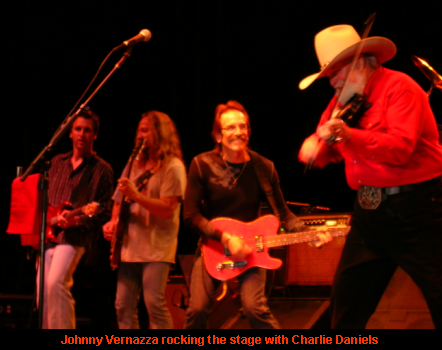 Johnny
gives this advice to young players - "I
think it's eyes and ears - always be aware, look and listen... I remember one
time, we are on the road with Elvin and we were walking past this bar, and I
stopped to listen to this gujtar player who was playing at a Holiday Inn. And
the guy's said 'What the hell are you doin'?' And I said 'I'm listening to this
guy, this guy's good!' My point was that you can always pick something up from
somebody, no matter how good or how bad they are... I try on stage to surround
myself with musicians who keep their eyes and ears open. This way you can drop
the ball... it's like watching the old football games and somebody will fumble
the ball and it will change hands five or six times and they still get a
touchdown because everyone is watching, paying attention..." Johnny
gives this advice to young players - "I
think it's eyes and ears - always be aware, look and listen... I remember one
time, we are on the road with Elvin and we were walking past this bar, and I
stopped to listen to this gujtar player who was playing at a Holiday Inn. And
the guy's said 'What the hell are you doin'?' And I said 'I'm listening to this
guy, this guy's good!' My point was that you can always pick something up from
somebody, no matter how good or how bad they are... I try on stage to surround
myself with musicians who keep their eyes and ears open. This way you can drop
the ball... it's like watching the old football games and somebody will fumble
the ball and it will change hands five or six times and they still get a
touchdown because everyone is watching, paying attention..."
Generally, Johnny doesn't have any trouble
maintaining his enthusiasm for what he does, though he confesses that he doesn't
have the energy he had when he was younger. "God bless Tommy
Castro - he's a little younger than I am - but I couldn't do two hundred some
dates a year..." "It hardly
ever feels like work," says Johnny. "The only time it feels like work is if I get called for a
gig, and the money is just so good that I'll take it... and then, I could watch
a ballgame on TV and not even worry about what I'm playing, because I'm just
there... a mediocre kind of thing, that's work. Sometimes I'll take a
small gig that will be a load of fun with players of half the caliber. It gets
back to the eyes and ears and how the attitude is. Nothing is worse than people
who make the same mistakes more than once, or don't keep their eyes open... it's
a train wreck, and it's like the same train wreck at the same corner every
day..." The
Best of Times Johnny
Vernazza has always been an upbeat guy with the youthful enthusiasm that
typifies rock dudes. He still loves the music and, 18 years sober and in a happy
10-year marriage, he seems to be in a golden period in his life. The day I
talked with him, he chatted amiably, answering my questions while watching
himself on television, performing as a member of the Elvin Bishop band on videos
being shown on the Country Music Television's Tribute to Southern Rock. He has a
25-year old daughter and a 4-year old grand daughter, and he remains in close
touch with his many friends. That's
not to say that he is exactly the same guy he always was. When he moved from the
"liberal" Bay Area to the "conservative" San Diego area he
started to feel himself drifting a bit from his old ways of thinking. "My
wife keeps saying the reason I've changed - I'm Independent now - is 'because of
all your drug years and all your drinking and everything else that now you feel
this moral righteousness that you must live. I feel I have turned away from the
left side a lot, from where I used to be. The guys in Norton's band
especially, I have some fun with those guys and they'll give me a real hard
time. I'm just down here in Southern Cal and there's just different things that
I have that I kinda believe in, and we'll see if I'm right as time goes on. "But politically, nothing changes. We can try what we can, and there's gonna be
gas prices that are sky high, and there's going to be reasons why that is, and
there are going to be wars and there is not going to be war... and so we just
try to do what we can do... I am an optimist. I definitely think that things
will get better, and you've got to work to make it better, without a doubt. "I
mean, we became politically involved in our little neighborhood here just
because of some roads they wanted to open by our house and things like that. But
then we also had a very bad experience with some neighbors who bought a house
next to us, and we're in top-notch suburbia, that were doing some illegal things
and the other neighbors were just turning their head, and we said 'We just moved
here from Oakland, and this isn't going to happen here...' Johnny
isn't one of those guys who lives with a lot of regret, including over the
substance abuse and jail time. "That's part of my life," he says,
accepting life for what it's been. He is thinking about how things changed for
him, and considering telling his story in a book. "I want
to write about why...and maybe help some other people not go down that same
path." "I
think I'm probably happier now than I ever was. I'm married to my best friend
and I love her. We have a beautiful house. The only thing is, it's like starting
a career over..." Johnny is doing
studio work as a producer, recording his old friend Annie Sampson, who
was the singer with the popular Bay Area '70s band Stoneground, SF blues
guitarist Ron Hacker, and the Joplinesque blues belter Michelle
Lundeen. He has also produced and recorded with rockers Scarlet Theory,
bluesmen S.E. Willis, Bob Brozman, Merle Brandon,
Yoshinobu Takeda and Andrej Sifrer. Postscript
- Johnny's World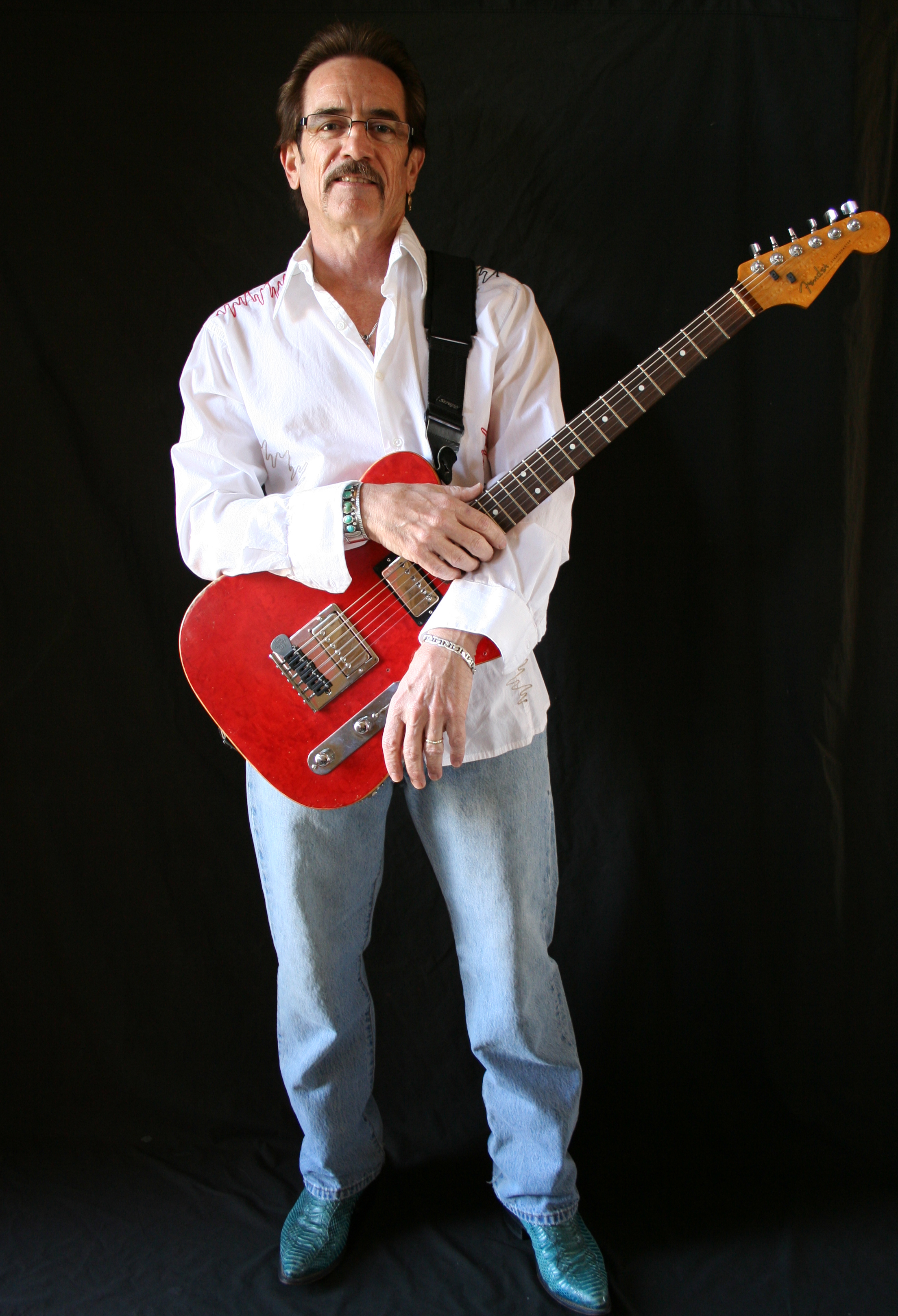
Johnny
V, even considering his associations with rock rebels, enablers and party boys,
has always kept good company. His wife Trish
must have been a positive influence. She is a force in her own right and there
is a brief bit below that provides some information on who she is, along with a
link to her website. Check it out. She does wonderful artwork and has an
impressive resume. Her background as a Berkeley creative-intellectual is
apparent in everything about the work she displays on her site, which puts
Johnny's story above in an interesting context. She and Johnny must make a
fascinating couple. Another important person in Johnny's story is Arlic
Dromgoole, who has taken Johnny under his wing as his media
representative and booking manager. 
Trish Vernazza, M.A.
is an accomplished artist and art therapist who has been a frequent guest
speaker on NBC's reality TV show "Starting Over." You can learn more
about her, her artwork, and her distinguished career by visiting her website at www.trishv.com.
Trish Vernazza is the author of Women, Art and
Mental Illness, a project that grew from her work at the Berkeley Creative
Living Center, where she led intensive workshops to surface women's issues and
create artwork to capture their feelings and moods.
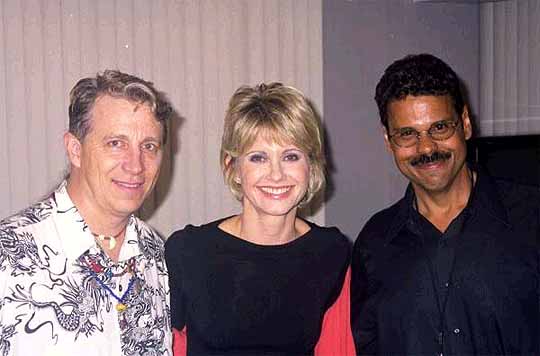
Left
to Right: Norton Buffalo, Olivia Newton-John, and Arlic Dromgoole. 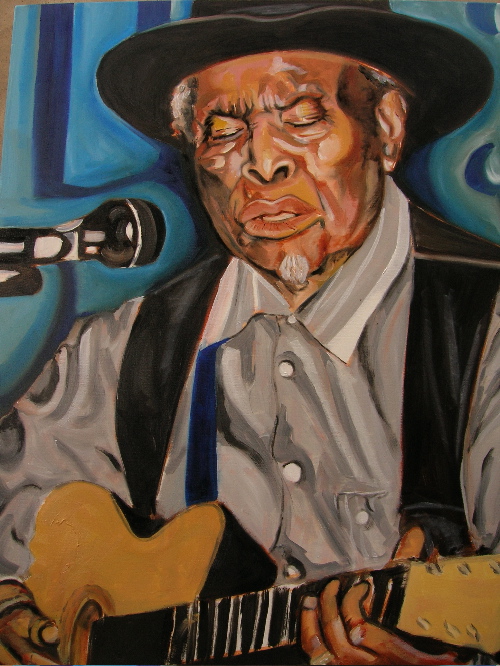
Arlic
DromgooleIdid
the painting on the left of bluesman Honeyboy Edwards. A
longtime friend of Norton Buffalo's, and now the manager of Johnny V, Arlic is a
retired (32 year career) San Diego school teacher, and an artist/musician in his
own right. A
Bay Area native, Arlic in the '60s played in
a band called the Purple Orange. "We started in high school at Harry Ells
High (in Richmond) where many other great bands came from. The King Brothers
band, Lee and Sam King who played with their cousins Albert and Freddy, were
also in my class. Norton Buffalo - who is one of my longest and best friends -
and I went to Junior high together, he was 2 years younger than me. He
used to come to my band practices. If you go to http://home.comcast.net/-obertson
you will see a picture of my band and many of the other Garage Bands of the
60's. Different
from the others, we actually opened for the Grateful Dead for a week in Rio
Neito on Russian River, for Blue Cheer and Santana, at Contra Costa College. I
went to California College of Arts and Crafts in 1967 and was involved with
everything that happened in the Summer of Love. I hung out with people like
Janis Joplin, Chicken Hersh, Michael McClure, and his friend Jim Morrison, that
he would bring to school to work on poetry. We played at a park in Berkeley
called Provo Park, a lot on the weekends. Bands used to play all day for free,
just for the love of the music. That's where I met another old friend of mine,
Charlie Musselwhite." Arlic
made an interesting statement when I asked him about his background. "I have
enough stuff to fill a book, but don't have time to write, because I'm still
living it."
GO TO:
ARTIST NEWS
•
YOU
ARE ON A SPECIAL FEATURES PAGE
|
 |
|
©Rick
Alan Rice (RAR),
May, 2012
|
|

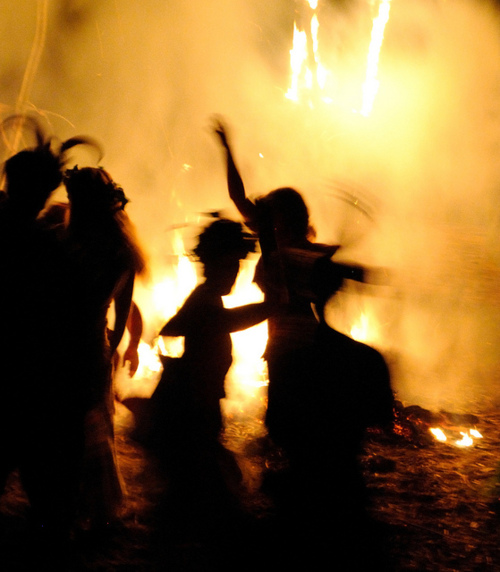
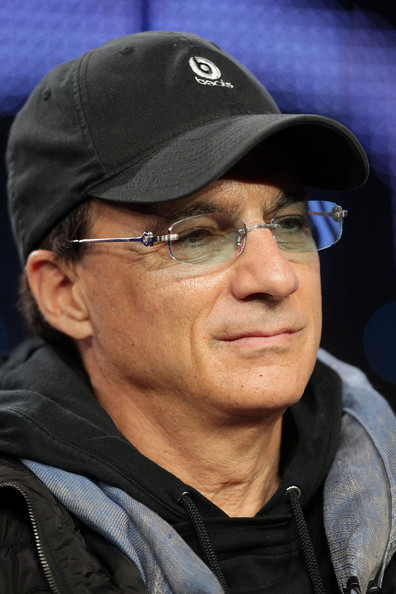 Learning
from Jimmy Iovine
Learning
from Jimmy Iovine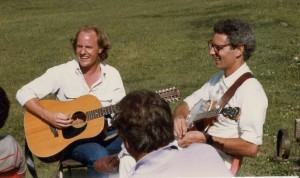



 Fox
got an odd break in 1970 when they were recruited by a shadowy Korean
"mob" figure called "Jermaine" to play a big money club show in Hawaii.
"We went over on a one-way ticket," says Johnny. They played the first
night and were paid as advertised, but after that there was no pay coming,
just work. They were stuck on the island. "It was real
ugly, at first. We got saved by John Selby, who was managing Quicksilver."
Fox
got an odd break in 1970 when they were recruited by a shadowy Korean
"mob" figure called "Jermaine" to play a big money club show in Hawaii.
"We went over on a one-way ticket," says Johnny. They played the first
night and were paid as advertised, but after that there was no pay coming,
just work. They were stuck on the island. "It was real
ugly, at first. We got saved by John Selby, who was managing Quicksilver." 
 Feel
Like Goin' Home
Feel
Like Goin' Home


 Johnny
gives this advice to young players - "I
think it's eyes and ears - always be aware, look and listen... I remember one
time, we are on the road with Elvin and we were walking past this bar, and I
stopped to listen to this gujtar player who was playing at a Holiday Inn. And
the guy's said 'What the hell are you doin'?' And I said 'I'm listening to this
guy, this guy's good!' My point was that you can always pick something up from
somebody, no matter how good or how bad they are... I try on stage to surround
myself with musicians who keep their eyes and ears open. This way you can drop
the ball... it's like watching the old football games and somebody will fumble
the ball and it will change hands five or six times and they still get a
touchdown because everyone is watching, paying attention..."
Johnny
gives this advice to young players - "I
think it's eyes and ears - always be aware, look and listen... I remember one
time, we are on the road with Elvin and we were walking past this bar, and I
stopped to listen to this gujtar player who was playing at a Holiday Inn. And
the guy's said 'What the hell are you doin'?' And I said 'I'm listening to this
guy, this guy's good!' My point was that you can always pick something up from
somebody, no matter how good or how bad they are... I try on stage to surround
myself with musicians who keep their eyes and ears open. This way you can drop
the ball... it's like watching the old football games and somebody will fumble
the ball and it will change hands five or six times and they still get a
touchdown because everyone is watching, paying attention..."




